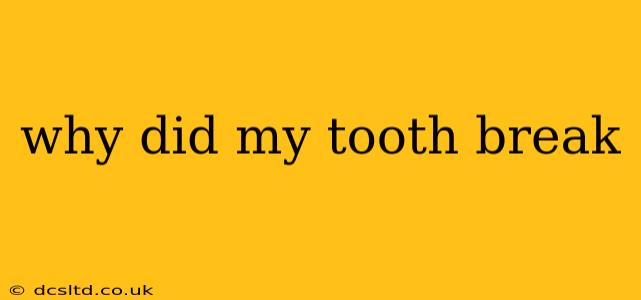Why Did My Tooth Break? Understanding the Causes of Tooth Fractures
A broken tooth is a painful and unsettling experience, leaving you wondering what caused this sudden damage. The truth is, several factors can contribute to tooth fractures, and understanding these causes is the first step towards prevention and effective treatment. This article explores the common culprits behind broken teeth, helping you understand why yours might have fractured.
What are the most common causes of a broken tooth?
This is a key question many people ask after experiencing a broken tooth. The most common causes include:
-
Trauma: This is often the leading cause. A direct blow to the mouth from a fall, sports injury, or car accident can easily fracture a tooth. Even seemingly minor impacts can cause unseen damage that may only become apparent later.
-
Grinding or Clenching (Bruxism): Unconsciously grinding or clenching your teeth, often during sleep, puts immense pressure on your teeth over time. This constant stress can weaken the enamel and lead to cracks or fractures, even without a significant impact.
-
Decay: Extensive tooth decay can significantly weaken the structure of a tooth, making it more susceptible to breaking, especially under pressure from chewing or biting. The decay weakens the tooth's internal support.
-
Dental Procedures: While rare, certain dental procedures, particularly those involving extensive drilling or large fillings, can occasionally weaken a tooth, increasing the risk of fracture. This is usually only a concern with already compromised teeth.
-
Underlying Medical Conditions: Some underlying medical conditions, like osteoporosis or eating disorders, can weaken bones and teeth, making them more vulnerable to fractures. These conditions often require specific medical management.
-
Pre-existing Cracks (Hidden Fractures): Sometimes, a tooth may have a pre-existing crack, invisible to the naked eye, that eventually leads to a complete fracture under stress. These are often difficult to diagnose until a break occurs.
Can a cracked tooth heal on its own?
Unfortunately, no. A cracked tooth will not heal itself. The hard enamel and dentin of your teeth lack the regenerative capacity of soft tissues. Any crack, no matter how small, requires professional dental intervention. Ignoring a cracked tooth can lead to further complications, including infection, pain, and potential tooth loss.
What should I do if I think I have a broken tooth?
See a dentist immediately. Delaying treatment can worsen the problem and complicate the repair process. Your dentist will be able to assess the damage and recommend the appropriate treatment, which may include bonding, crowns, root canals, or even extraction in severe cases.
How can I prevent a tooth from breaking?
Preventing a broken tooth involves proactive measures:
-
Wear a mouthguard: If you participate in contact sports, always wear a properly fitted mouthguard to protect your teeth from impact.
-
Manage bruxism: If you grind or clench your teeth, talk to your dentist about treatment options, such as a mouthguard or stress management techniques.
-
Maintain good oral hygiene: Regular brushing, flossing, and dental checkups help prevent decay, which weakens teeth.
-
Avoid biting hard objects: Refrain from using your teeth to open packages or bite into excessively hard foods.
-
Address underlying medical conditions: If you have any medical conditions that weaken bones or teeth, work with your doctor and dentist to manage them effectively.
By understanding the various causes of broken teeth and taking preventative steps, you can significantly reduce your risk of experiencing this painful and potentially costly dental problem. Remember, prompt professional care is crucial for the best possible outcome if a fracture occurs.
